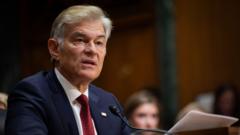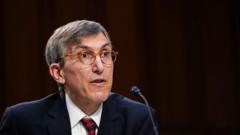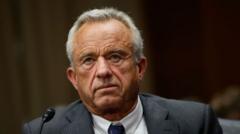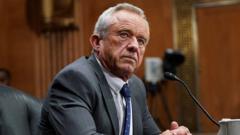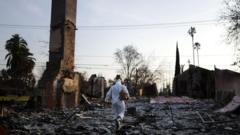Health Secretary Robert F. Kennedy Jr.’s controversial stance raises concerns among experts about pandemic readiness.
**US Government Halts $500 Million mRNA Vaccine Initiative Under RFK Jr.**

**US Government Halts $500 Million mRNA Vaccine Initiative Under RFK Jr.**
The cancellation of mRNA vaccine funding sparks debates on vaccine safety and future preparedness.
In a startling decision, the US Department of Health and Human Services (HHS) has announced its cancellation of $500 million (£376 million) in funding designated for the development of mRNA vaccines aimed at combating respiratory viruses, including COVID-19 and the flu. This pivot affects 22 major projects, involving pharmaceutical giants such as Pfizer and Moderna, geared towards vaccines against avian flu and other diseases.
Health Secretary Robert F. Kennedy Jr., known for his skepticism regarding vaccines, justified the funding withdrawal by claiming that "mRNA technology poses more risks than benefits" for addressing these respiratory viruses. His statement has faced significant pushback from the medical community, many of whom argue that his ongoing challenges to vaccine safety undermine public health efforts.
Peter Lurie, a former US Food and Drug Administration official, emphasized the importance of mRNA vaccine development, highlighting their crucial role in curbing the COVID-19 pandemic and potentially saving millions of lives. He criticized the government’s decision as a step away from an essential tool in the fight against future pandemics.
Kennedy responded to backlash by asserting that his analysis, grounded in scientific review and expert consultations, indicated these vaccines did not adequately protect against infections like COVID-19 and the flu. He indicated that the funding would be redirected towards developing "safer, broader vaccine platforms" that adapt more effectively to viral mutations.
Contrary to Kennedy's assertions, health experts, including Dr. Paul Offit from the Vaccine Education Center at Children’s Hospital of Philadelphia, questioned the notion that mRNA vaccines contribute to viral mutations. They highlighted that virus mutations occur independently of vaccination and noted that mRNA vaccines have proven to be both safe and effective.
Following this funding cancellation, HHS stated that its focus would shift to vaccine platforms with clearer safety records and transparent clinical practices. The mRNA vaccination method teaches the body to create proteins that invoke an immune response, making it a pioneering technique in vaccine development tested extensively before its emergency rollout.
As Kennedy's administration continues to reshape the health department’s vaccine strategy, he previously dissolved an influential vaccine committee and removed COVID-19 vaccines from the CDC's official immunization recommendations for healthy children and pregnant women. Critics worry these actions could hamper the nation's preparedness for possible future outbreaks.
Health Secretary Robert F. Kennedy Jr., known for his skepticism regarding vaccines, justified the funding withdrawal by claiming that "mRNA technology poses more risks than benefits" for addressing these respiratory viruses. His statement has faced significant pushback from the medical community, many of whom argue that his ongoing challenges to vaccine safety undermine public health efforts.
Peter Lurie, a former US Food and Drug Administration official, emphasized the importance of mRNA vaccine development, highlighting their crucial role in curbing the COVID-19 pandemic and potentially saving millions of lives. He criticized the government’s decision as a step away from an essential tool in the fight against future pandemics.
Kennedy responded to backlash by asserting that his analysis, grounded in scientific review and expert consultations, indicated these vaccines did not adequately protect against infections like COVID-19 and the flu. He indicated that the funding would be redirected towards developing "safer, broader vaccine platforms" that adapt more effectively to viral mutations.
Contrary to Kennedy's assertions, health experts, including Dr. Paul Offit from the Vaccine Education Center at Children’s Hospital of Philadelphia, questioned the notion that mRNA vaccines contribute to viral mutations. They highlighted that virus mutations occur independently of vaccination and noted that mRNA vaccines have proven to be both safe and effective.
Following this funding cancellation, HHS stated that its focus would shift to vaccine platforms with clearer safety records and transparent clinical practices. The mRNA vaccination method teaches the body to create proteins that invoke an immune response, making it a pioneering technique in vaccine development tested extensively before its emergency rollout.
As Kennedy's administration continues to reshape the health department’s vaccine strategy, he previously dissolved an influential vaccine committee and removed COVID-19 vaccines from the CDC's official immunization recommendations for healthy children and pregnant women. Critics worry these actions could hamper the nation's preparedness for possible future outbreaks.











